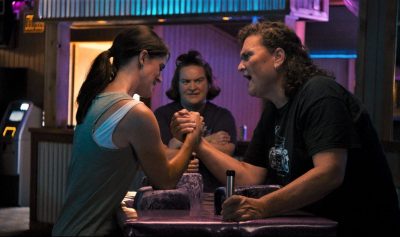


Fresh off her scene-stealing role as Jane in last summer’s breakout hit, Happiest Season, Mary Holland stars as Melanie, a soon-to-be-divorced, struggling coffee shop owner who doesn’t realize how stuck in a rut she is until her old best friend from college, Danny (Betsy Sodaro), comes to visit. Danny drives a truck for a living, but her real passion in life is arm wrestling. Having just suffered a humiliating defeat in a match to her rival, Brenda (Olivia Stambouliah), Danny hopes to convince Melanie to take up arm wrestling so she can beat Brenda in the big national competition. Danny remembers how good Melanie was in college, and hopes that, with a little training, she can get her in shape in time. Hesitant at first, Melanie is tempted by the prize money and agrees. While the rest is pretty much exactly as you would expect, it’s pretty hard to still not get sucked in, simply because this well-worn shoe feels so incredibly comfortable.
First-time feature film director Maureen Bharoocha and first-time feature film co-writers Ann Marie Allison and Jenna Milly found a way to make an insanely predictable movie work as a massively entertaining and, dare I even say, fresh film that I loved every minute of. It’s got all the tropes that we’ve seen in big, broad studio comedies, but what works is it totally leans into them instead of trying to dress them up as anything else. For example, Allison and Milly play into the trope of the grizzled trainer who breaks down our innocent heroine before building her up again by seemingly writing the movie around Dot-Marie Jones, who was herself an arm-wrestling world champion 15 times over before she became an actress. This perfect casting not only works for the authenticity of it all, but Jones clearly is having a blast, and it’s impossible to not love every second of it.
Every moment of standard-issue comedy fare works here, from the reluctant hero who blossoms just in time, to the odd group of colorful characters who create an ensemble that is weird, wacky and hilarious, and, of course, the big final showdown, complete with every bit of genre-baiting cliché you could dream of. It all works because it feels so effortless. It never once pretends to be something it’s not. Golden Arm knows that it’s the female Beerfest, Dodgeball, Happy Gilmore or whatever other broad, ensemble male sports stupid competition comedy that has been flung at audiences for decades, and why the hell not. It’s about time women get to be silly, arrogant, aggressive, idiotic and hilarious.
But while I loved Golden Arm’s simplicity and energetic enthusiasm about embracing its predictability, that’s not even the best part of it. What gives Golden Arm its luster is the chemistry between Holland and Sodaro, and the deliciously appealing performances each one delivers. Holland plays Melanie as a character we know so well, the straight-laced, repressed American woman, whose fire has been put out by being pigeon-holed in a society that expects her to follow the rules. But when she is paired with Sodaro’s Danny, who is a brash, loud, enthusiastic, perpetually optimistic, foul-mouthed free spirit, something ignites in each of them and their friendship gives them each the courage and strength to pursue their dreams and stand up to their insecurities. It may all sound very cliché and trite, but these two performers make the absolute most of every moment, and make every scene, no matter how familiar, enjoyable. The script is surprisingly tight and the dialogue fresh and funny, not a wasted scene in the film’s brisk 90 minutes.
But it is Sodaro, who comes off as a cross between Jack Black, Melissa McCarthy and Yosemite Sam, that is truly Golden Arm’s secret weapon. She is the kind of energy we rarely get on screen, especially from a woman. Having spent most of her career as a voiceover artist, it’s nice to see her find an on-screen role so perfectly suited to her strengths. I would love to consider this the same kind of breakout role like McCarthy’s was in Bridesmaids, but I may be hoping for too much. After all, this is still Hollywood, and this is still a female-driven comedy, so the chances of it making much of a dent are small. BUT, if you want to send a message to Hollywood that we need more movies like this, more movies that are by and about women, that challenge the status quo, that present women in all types of roles and tell their own stories, then I encourage you to spend some time and money on Golden Arm. It may not be the most original thing you’ve ever seen, but it just might surprise you.
